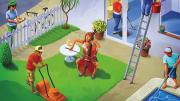Anyone who’s indulged in retail therapy can affirm that money can’t buy happiness—but according to new research from Harvard Business School, money can make people happier when they spend it to buy time. Assistant professor of business administration Ashley Whillans has found that, in developed countries, people across the socioeconomic spectrum who trade money for time—by choosing to live closer to work, or to hire a housecleaner, for example—are happier.
“People have been trying to find ways to use their discretionary income to maximize their quality of life for a long time,” Whillans says, citing extensive research that confirms the positive emotional effects of taking vacations and going out to the movies. “We were really interested in seeing if buying ourselves out of negative experiences might be another pathway to happiness that had been relatively unexplored.”
According to the researchers, two key components of happiness make up people’s subjective sense of well-being: how they describe their life on the whole; and how satisfied they feel in the moment, which the researchers measured by checking in with participants on the day of a given experience. Feelings of “time stress”—more common among the wealthiest individuals—also affect happiness. Higher-earners feel that every hour of their time is more financially valuable, and when something is perceived as valuable (like water in a desert, Whillans says), it is also perceived as more scarce. That scarcity translates into time stress, which can easily contribute to unhappiness.
To assess the impacts of buying one’s way out of negative experiences, the team surveyed residents of the United States, Canada, Denmark, and the Netherlands, ranging from those who earned just $30,000 per year (but reported that their basic life needs were being met) to middle-class earners and millionaires. Study participants in Vancouver, for example, were given $80: half to be spent on a service that would save one to two hours, and half to be used for a material purchase, like clothing or jewelry. After making a time-saving purchase—take-out food proved the most popular item—participants were more likely to report positive feelings and less likely to report feelings of time stress than after their shopping sprees.
Whillans did identify a caveat, however: recurrent time-saving purchases can eventually lead to complacency, which threatens future satisfaction from more such purchases. To minimize this ”hedonic adaptation,” she suggests consciously filling those one to two saved hours with an activity people would otherwise not have time for. This creates an internal transaction in which the decision to get take-out rather than cook, for example, affords an hour or two for a pleasurable activity instead.
People who repeatedly report having positive daily experiences, Whillans found, are more likely to seek out the kinds of relationships and activities that, over time, can lead to higher life satisfaction. Conversely, a person who deals with repeated stressors is less likely to have the mental and emotional resources for happiness-enhancing activities and socializing. The theory helps to explain why working single mothers, in particular, are likely to benefit from time-saving purchases, which offer them a way to obtain social support through the market economy that might otherwise be supplied by a partner who shares household chores or grocery shopping.
In Canada and the United States, where busyness is often flaunted as a status symbol, outsourcing tasks such as cooking and cleaning can be culturally challenging—people like to pretend they can do it all, Whillans admits. Women in particular find themselves stuck with a “second shift,” returning from work to housekeeping chores and childcare. As a consequence, Whillans explains, women “have more educational opportunities than before, and [are] likely to be making more money and holding high-powered jobs,” but their happiness is not increasing commensurately. Continuing research in collaboration with Brierley professor of business administration Michael Norton will explore the role of gender in making time-saving purchases, and its influence on relationship satisfaction and chore division at home. “The initial evidence,” she says, shows that among couples who buy time, “both men and women feel less pulled between the demands of work and home life, and that positively impacts the relationship.”
She hopes her research will ameliorate some of the guilt both women and men may feel about paying a housekeeper or hiring someone to mow the lawn—or ordering Chinese takeout on Thursday nights: after all, the benefits are quantifiable.









